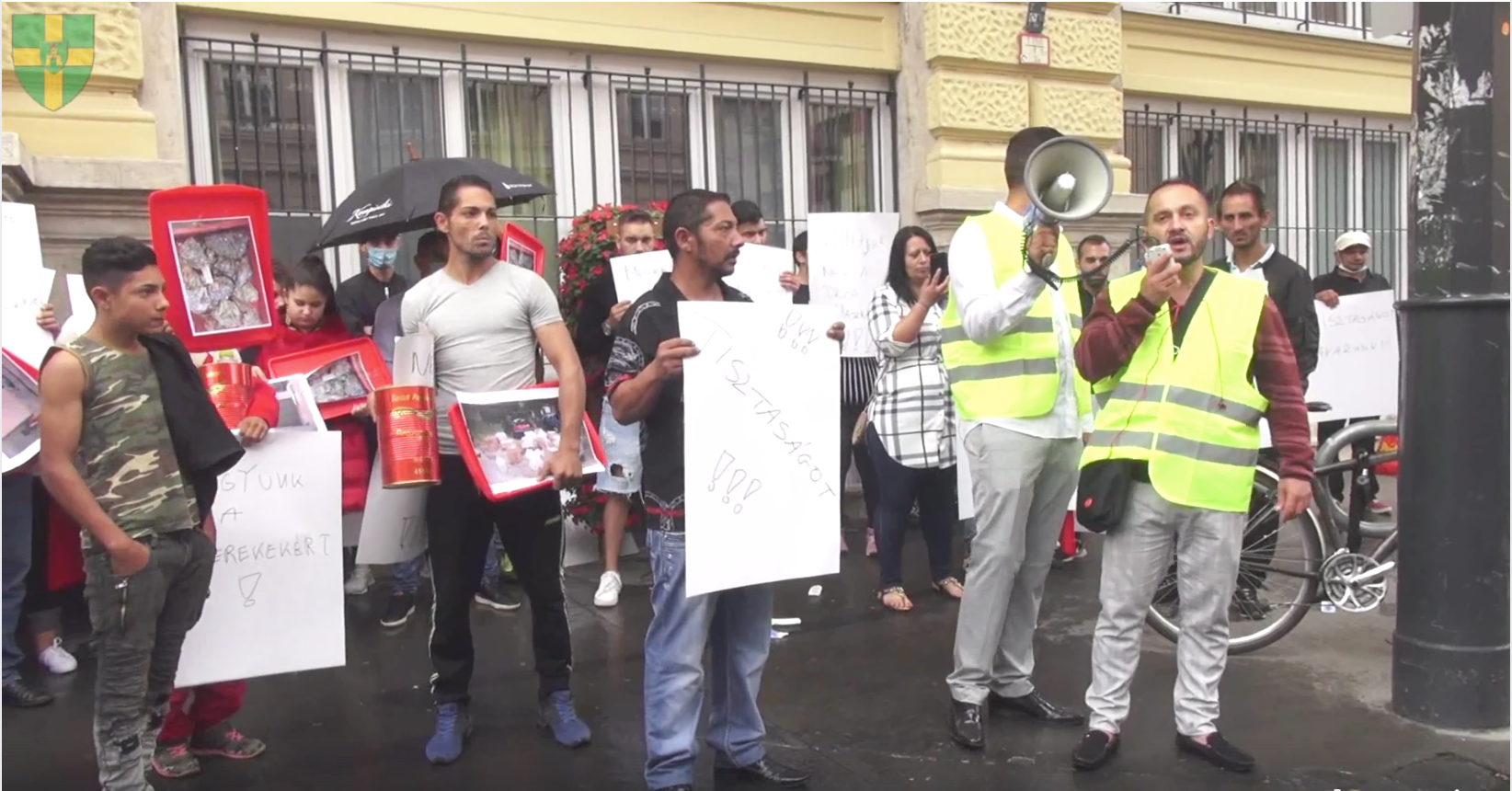Resignations begin at Index after firing of editor-in-chief, protest for press freedom planned
- Stay updated on the latest news from Hungary by signing up for the free InsightHungary newsletter:
Three employees at Index.hu resigned after a meeting on Thursday where staff members unanimously requested the reinstatement of former editor-in-chief Szabolcs Dull, who was fired on Wednesday amid alarm that the outlet had become the target of a political takeover.
The chairman of the foundation that owns Index László Bodolai, who himself fired Dull, refused to rehire him, after which Kata Janecskó, András Dezső and Bálint Szalai tendered their resignations.
Bodolai left the building following the resignations, and other journalists who went to his office to hand in their own resignation letters found it empty.
According to a statement by the staff, their demand to reinstate Dull was firmly rejected by Bodolai, who said in a written response that "the loss of confidence in [Dull] is so deep that I cannot work with him in any way".
Further resignations are expected at Index as Dull and other staff members have raised the alarm that the site's independence is under attack. Dull's firing was the latest major change at Index after weeks of shakeups that led to fears that the site was the target of a politically motivated coup.
In response to the events at Index, the Momentum party has scheduled a protest for media freedom on Friday afternoon in Budapest.
The protest will begin at Puskás Öcsi tér in Buda, near Index's headquarters, and a march will follow to the Karmelita Monastery in the Castle District which houses the office of the Prime Minister.
In a Facebook event for the protest, Momentum wrote, "The Index editorial board made clear what's happening: interference in their work, threats, blackmail, coercion, and exertion of pressure...We can't allow this!"
The demonstration comes after Dull was reportedly offered a substantial sum of money if he would quietly resign of his own accord, which he rejected.
Momentum earlier wrote that Dull's firing "drove a new, enormous nail into the coffin of a free press and a free country."
Orbán claims victory in EU budget negotiations as rule of law conditionality appears in agreement
After four days and nights of negotiations, European Union leaders concluded an agreement in Brussels on Tuesday on the bloc's next seven-year budget and a major pandemic relief package.
While a consensus was reached by EU leaders on the terms of the €1.074 trillion budget and €750 billion relief fund, opinions remained divided on whether the agreement favored demands made by Prime Minister Viktor Orbán in the lead up to the negotiations.
Orbán threatened to veto the agreement if it did not satisfy a number of requirements laid out in a resolution passed by the Hungarian Parliament last week. Orbán said he would reject the agreement if: richer EU countries received more money than poorer ones; member states could not decide for themselves on how to use budget and relief funds; Article 7 proceedings were not dropped against Hungary; the EU continued funding human and minority rights NGOs, and; disbursement of EU funds would be conditional on rule of law criteria.
Following the signing of the agreement, Orbán held a joint press conference with Polish Prime Minister Mateusz Morawiecki in which he hailed the negotiations as a victory for Hungary in which he had "defended our national pride". Orbán claimed that "political and ideological" rule of law conditions had been stricken from the terms of the agreement.
However, none of Orbán's demands were fully met.
Concerning use of the pandemic relief fund, the agreement stipulates that member states may only spend the money on centrally approved projects that are directly related to economic damage caused by the coronavirus pandemic.
Furthermore, one section declares that “a regime of conditionality to protect the budget and Next Generation EU [the €750 billion recovery fund] will be introduced...In this context, the Commission will propose measures in case of breaches for adoption by the Council by qualified majority.”
While the inclusion of a passage on democratic conditions for the disbursement of EU funds appears to be a setback for Orbán, the vague language of the section confounded some observers. According to some interpretations, rule of law conditions were watered down and kept deliberately vague. While the agreement states that sanctions could be imposed by a qualified majority of the European Council over rule of law violations, such a process would entail a complicated procedure that would make sanctions difficult to pass.
Some signs indicate that a more defined procedure for sanctioning countries could be in the making. The European Parliament will hold an extraordinary plenary session on Thursday where the five largest parliamentary groups, including the European People's Party of which Fidesz is a suspended member, will express their dissatisfaction with some terms of the budget and relief package agreement. According to Socialist MEP István Újhelyi, the groups will call on the Council "to take the necessary steps to protect the EU budget" by developing a clear mechanism for dealing with rule of law breaches.
Additionally, European Commission president Ursula von der Leyen confirmed reports that the European Council was working on a "mechanism for conditionality" which could be triggered by a qualified majority vote in the Council. Such a mechanism would require the approval of only 15 of 27 member states, making a veto by countries that oppose conditionality (like Hungary and Poland) nearly impossible.
It remains unclear whether Article 7 procedures currently underway against Hungary will be dropped as part of the agreement. While the text made no mention of the end of the procedures, pro-government media reported early this week that German chancellor Angela Merkel promised Orbán that they would be dropped by the end of Germany's rotating presidency of the Council in December. However, this claim was not confirmed by German sources.
Out of town demonstrators appear at 8th district protest
Some 100 demonstrators gathered in front of the 8th District government office in Budapest on Saturday to protest against the opposition mayor of the district András Pikó.
In a video report prepared by the district's free newspaper, many of the protesters acknowledged that they had come in groups from cities and towns such as Monor, Kisbér and Szolnok, more than 100 km from the capital. Some protesters said they did not speak Hungarian, and others that they did not know why they were protesting in the 8th District and that they had only come in response to an event posted on the internet.
Some demonstrators said they were protesting over poor conditions in the working-class district, such as a decline in public safety and cleanliness, an increase in drug use and poor quality food served in schools.
On Monday, the pro-government newspaper Magyar Nemzet wrote that the 8th District government may have called demonstrators from towns in the countryside to protest against itself.
Late summer festivals likely to be cancelled, Pride parade called off
Parliament could decide on a proposal Tuesday which would extend the ban on events of over 500 people beyond its current August 15 expiration date, HVG reports drawing on government sources.
The extension of the ban would limit cultural gatherings - including concerts, festivals and theatre performances - to 200 people, and would effectively cancel all such events that had been rescheduled for after August 15 including festivals like B. My Lake, Strand, Fishing On Orfű, EFOTT, the Veszprém Street Music Festival, SZIN, Fekete Zaj, Kolorádó, and others.
Several of HVG's government sources criticized the plan, saying it would be "a mistake with catastrophic consequences" for the cultural sector, and suggested imposing strict rules for the holding of events instead.
On July 16, the prime minister's chief of staff Gergely Gulyás told a press conference that sports matches may still be attended by spectators. When asked why football matches could take place but cultural events would be banned, Gulyás said that alcohol consumption at concerts causes attendees to ignore social distancing guidelines, while alcohol is prohibited at football matches. (Beverages of under 5 percent alcohol by volume, such as beer, are sold at sports matches - Ed.)
Hungary was the first in the European Union to allow spectators back to football matches following restrictions imposed because of the coronavirus.
On Tuesday, Budapest Pride announced that it would call off the annual Pride Parade over pandemic concerns. Organizers of the Pride Festival for LGBTQ rights said that they would find alternative ways for conveying their political message, and that the week-long 25th Pride Festival would still be held featuring 37 smaller events around Budapest.
The InsightHungary newsletter will not be published next week. Please keep an eye out for our next edition which will appear on August 6.




